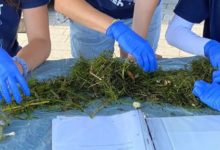How a pilot project in Whitby is turning plastic waste into fuel
A pilot project in Whitby, Ont., is using technology to give plastic waste a second life by turning it into diesel fuel and gasoline.
The technology, dubbed the Phoenix, can convert single-use items like plastic bags and Styrofoam — items that would otherwise end up in landfill.
John O’Bireck, president of energy investment company Sparta Group, says he sees plastic “as a resource, not a scourge.”
He says the fuel produced by Phoenix is already being used in his company’s fleet of trucks that transport industrial waste.
“Five tonnes of plastic can be converted into about 4,000 litres. And 4,000 litres can drive our whole fleet of 10 vehicles back and forth every day running 16 hours a day.”
O’Bireck says Phoenix uses a process involving pyrolysis — using heat to bring about decomposition — to upcycle plastics that can’t go into the recycling stream.
“If you take plastic as it stands, it’s going to go in the ground and it’s going to sit there for a thousand years. By adding this technology, we are converting it so that we give it one more chance to go back out.”
The process shreds the plastic into smaller pieces and feeds it into a “cooker.” O’Bireck claims it’s not being burned; the material is in an airtight vessel and being heated in the absence of oxygen.
“There’s actually two gases formed: condensable and non-condensable gas. We’re distilling it down to take it from its gas to a liquid.”
O’Bireck says the goal is to expand to municipalities and bigger companies.
“In industry, we could take it, convert the plastic and feed it back into the plant to be used by the plant.”
A company in Nova Scotia has been using a similar process to turn plastic into fuel; some other companies are turning plastics into Styrofoam that can be recycled again and again.
Sheila McGrory, manager of economic development with the Town of Whitby, says the town is happy to host the Phoenix pilot.
“They seem to be attracting a lot of international attention, people from various parts of the world coming to see the plant in operation,” she said.
“It’s a great technology. It’s very important for the future of the planet.”
‘We need to do much better at recycling’
Keith Brooks, program director at advocacy group Environmental Defence, says he would rather see more renewable fuels, such as wind and solar, being used because this technology doesn’t cut down the production of plastics in the first place.
“It still perpetuates the make-take-waste economy,” he said.
“You’re still taking chemicals, fossil fuels, oil, natural gas and using them as fuel, except you use them as plastic in the middle.”
Brooks says Canadians only recycle nine per cent of the plastics they use, and while there seems to be a growing awareness, residents are still failing to recycle properly.
“We think we need to do much better at recycling,” he said.
But Brooks says a big responsibility for this issue falls on the companies continuing to manufacture all of the plastic.
“We don’t think there should be any non-recyclable plastic. We should be designing plastics to be recycled.”
Environmental Defence wants to see a total ban on non-recyclable plastic altogether, and says the federal government’s proposal to ban single-use plastics as early as 2021 is a good start.
“Plastics aren’t going anywhere. It’s not breaking down, it’s just building up in our environment,” Brooks said.
O’Bireck says the pilot project aims to reduce the amount of plastic waste that needs to be dealt with.
“Taking the plastic we have and converting it or transforming it into something that can be usable is far better than throwing it into the ground,” he said.








Redes Sociais - Comentários